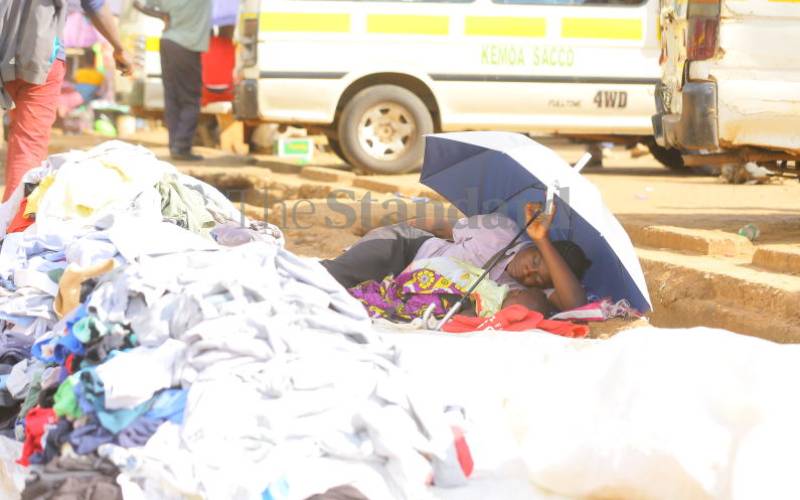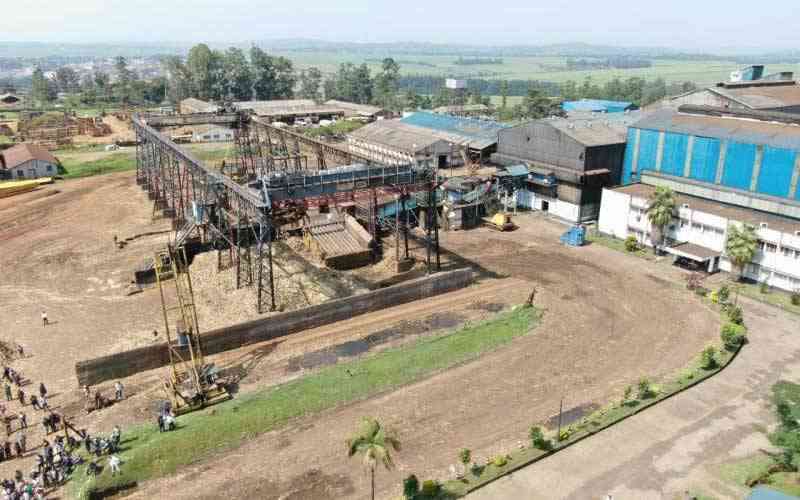Covid-19 wipes out 737,000 jobs as economy slows to -0.3 per cent
News
By
Macharia Kamau and Frankline Sunday
| Sep 09, 2021

Kenya’s economy contracted by 0.3 per cent in 2020 on the back of the Covid-19 pandemic that led to the worst economic crunch the country has recorded in over two decades. The size of the economy last year shrank to 8.71 trillion from Sh8.74 trillion in 2019. This means that the economy lost goods and services worth Sh27.6 billion.
According to the Kenya National Bureau of Statistics (KNBS), the decline in performance of key economic sectors like manufacturing and tourism was largely to blame, with suppressed demand and earnings forcing many firms to retrench thousands of workers.
However, using the current prices of goods and services in the economy, total output or what is known as nominal GDP increased to Sh10.753 trillion in 2020 up from Sh10.256 trillion recorded in 2019. This reflected an additional wealth of Sh497 billion to the GDP.
"The restriction in movements and social distancing led to disruption in labour supply, leading to reduced demand for goods and services,” said Treasury Cabinet Secretary Ukur Yatani while releasing the delayed 2020 Economic Survey.
READ MORE
Sony Sugar posts Sh113m profit after a decade of losses
What KNBS numbers reveal about economy in first 2 years under Ruto
CBK faces litmus test in fresh multi-billion-coin minting tender
Kenya tops African venture funding in 2024 with Sh82b
Kenya to legalise cryptocurrencies, says Treasury Cabinet Secretary
Mombasa port handled record 41.1m tonnes of cargo in 2024
KenGen to ramp up geothermal output with Hell's Gate project
Impact of Gen Z protests ripples through real estate
Why Sh1.4b cruise ship terminal is yet to bear fruit for Kenyans
"Accordingly, many businesses, especially service industries like tourism, significantly slowed down during the second quarter of 2020.”
More than 737,000 Kenyans lost their jobs in 2020. The survey indicated that over the year, total employment outside small-scale agriculture and pastoral activities stood at 17.4 million, down from 18.1 million recorded in 2019.
It further noted that wage employment in the private sector declined by 10 per cent to stand at 1.86 million jobs in 2020 from 2.06 million jobs in 2019.
In government however, there was an increase in the number of people with wage employment to 884, 600 in 2020 from 865,200 in 2019.
The informal sector also shed jobs, with the Survey saying the number of jobs in the sector contracted to 14.5 million compared to 15.1 million jobs in 2019.
Tourism and transport were among the sectors that were the biggest casualties, with earnings from tourism, going down 44 per cent. Agriculture and construction sectors however supported the economy during the pandemic year, growing 4.6 and 11.8 per cent respectively.
The biggest decline in economic performance was recorded in the Tourism sector. According to the survey, overall, the tourism sector indicators registered declines. Industry earnings went down 43.9 per cent to Sh91.7 billion in 2020. The sector has for several years been the biggest foreign exchange earner.
International visitors decreased by 71.5 per cent to stand at 579 600 in 2020. Hotel bed-nights occupancy rate contracted by 58 per cent while the number of international and local conferences declined by 87 per cent and 75.2 per cent, respectively, in 2020.
The transport sector also took a beating, contracting 7.8 per cent over the year compared to a growth of 6.3 per cent in 2019.
“In 2020, the sector performance was constrained by the Covid-19 pandemic containment measures including restriction of movement between countries and counties, social distance in public service vehicles and arrangements of working remotely,” said the Treasury CS Ukur Yatani.
Among the sectors that held the economy last year was agriculture, which registered a 4.6 per cent growth compared to a revised growth of 2.3 per cent in 2019.
The CS noted that performance by the sector was on account of good rains over the year.
Among key crops that were key to the sector’s performance include tea, where production grew 24.1 per to 569 500 tonnes in 2020 from 458 800 tonnes in 2019.
Horticulture was also a key crop, earning the country Sh150 billion during the tough year. Yatani attributed the earnings to better international export prices.
“This (growth in agriculture) was on account of favourable weather conditions in 2020 which improved production of food crops such as beans, rice, sorghum and millet and, livestock and related products such as milk and meat,” said Yatani.
Also on the rise was the construction sector which posted a growth of 11.8 per cent in 2020 compared to a growth of 5.6 per cent in 2019.
This was against the growth in local cement consumption, which was boosted by mega infrastructure projects including the Nairobi Expressway that is still under construction. The government’s housing projects under the Big Four Agenda also helped grow cement consumption. Uptake if cement grew 23 per cent.
“Cement consumption rose significantly from 6.1 million tonnes in 2019 to 7.4 million tonnes in 2020 representing an increase of 21.3 per cent,” said Yatani.
“The number of completed public residential buildings built by the State Department for Housing and National Housing Corporation (NHC) were 2,332 and 338, respectively in the year under review.”
Employment in the construction sector by a massive 33.0 per cent to 230 500 people in 2020 from 173 300 people in 2019.
The health sector is also among the few sectors that registered major growth as the government increased funding to fight the pandemic.
According to the sector, the National Government expenditure on health services rose by 34.5 per cent to Sh103.1 billion in 2019/20 while that of County Governments grew by 16.0 per cent to Sh 106.7 billion in the same period. The ratio of Government expenditure on health to total expenditure stood at 6.2 per cent in 2019/20.
The outcome was an increase in health facilities and the number of health professionals among other indicators.
The financial services sector also grew albeit at a slower rate. The sector, largely made up of banks and insurance companies, recorded a growth of 5.6 per cent in 2020 compared to a growth of 6.9 per cent in 2019. Banks were helped by increasing credit to the government through Treasury Bills and Bonds, which went up to Sh1.358 trillion in 2020 from Sh900.4 billion in 2019. Credit to the private sector also grew 8.4 per cent to Sh2.89 trillion in 2020 although banks adopted a cautious approach to lending to certain sectors.
“Financial activities sub-sector grew by 4.2 per cent in 2020 compared to 6.2 per cent growth in 2019 arising from an increase in domestic credit and credit advanced to national Government and private sector,” said Yatani.
ICT grew 4.8 per cent in 2020 a slower rate of growth compared to 7.5 per cent in 2019. According to KNBS, this growth was supported by increased uptake of digital services as the Covid-19 measures advocated for learning activities to be undertaken remotely and cashless payments for financial transactions. A big chunk of financial transactions also went online as authorities discouraged the handling of cash to prevent transmission of coronavirus.
The manufacturing sector, one of the pillars for the Jubilee Government’s Big Four Agenda, registered a decline of 0.1 per cent in 2020. This is in comparison to an increase of 2.5 per cent in 2019.
Hard hit by the Covid-19 pandemic, the sector shed 10 per cent of the jobs it had, with employment standing at 316 900 people in 2020.
The survey said the sector’s performance was supported by Sugar and cement production. Also support the sector was Export Processing Zones (EPZs), where total sales by EPZ enterprises increased by 4.3 per cent to Sh80.5 billion in 2020.

